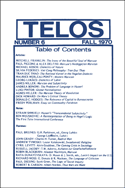As an occasional feature on TELOSscope, we highlight a past Telos article whose critical insights continue to illuminate our thinking and challenge our assumptions. Today, J. F. Dorahy looks at Agnes Heller’s “The Marxist Theory of Revolution and the Revolution of Everyday Life,” from Telos 6 (Fall 1970).
 The category of “everyday life” is a relatively new addition to the critical framework of Marxism. Since it was formally introduced by the French theorist Henri Lefèbvre (Critique de la vie quotidienne I, 1947; The Critique of Everyday Life, 1991), the critique of everyday life emerged in the post-1945 period as a response to the continuing stability of late capitalism and the integration of formerly radical elements of society within its logic of containment. From within the orbit of “actually existing socialism,” Agnes Heller’s critical anthropology of everyday life illuminates the integrative tendencies of both “great systems” during the Cold War via the prism of the alienated personality. While “The Marxist Theory of Revolution and the Revolution of Everyday Life” touches on numerous practical issues confronting the radical political movements on the late-1960s—including analysis of the ideological relevance of Che Guevara and the role of the sexual liberation movement in the formation non-alienated communities—its greatest and most enduring aspect is Heller’s focused and concise delineation of the phenomenology of personhood in the world-historical epoch of alienation.
The category of “everyday life” is a relatively new addition to the critical framework of Marxism. Since it was formally introduced by the French theorist Henri Lefèbvre (Critique de la vie quotidienne I, 1947; The Critique of Everyday Life, 1991), the critique of everyday life emerged in the post-1945 period as a response to the continuing stability of late capitalism and the integration of formerly radical elements of society within its logic of containment. From within the orbit of “actually existing socialism,” Agnes Heller’s critical anthropology of everyday life illuminates the integrative tendencies of both “great systems” during the Cold War via the prism of the alienated personality. While “The Marxist Theory of Revolution and the Revolution of Everyday Life” touches on numerous practical issues confronting the radical political movements on the late-1960s—including analysis of the ideological relevance of Che Guevara and the role of the sexual liberation movement in the formation non-alienated communities—its greatest and most enduring aspect is Heller’s focused and concise delineation of the phenomenology of personhood in the world-historical epoch of alienation.


